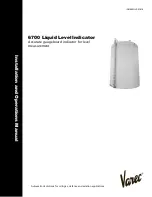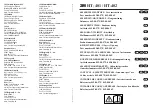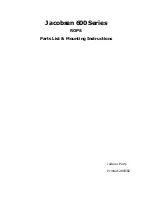
Do not expose the battery to temperatures over 50°C!
Make sure the battery does not get in contact with water!
Do not dispose of batteries in the toilet.
Do not dispose of the battery in a fire.
GENERAL SAFETY INSTRUCTIONS FOR ELECTRICAL TOOLS
1) WORKPLACE SAFETY
- The workplace must be kept clean and well lit. Clutter and dark spaces can cause accidents.
- Do not use power tools in areas where there is a risk of explosion or where flammable liquids, gases or
dust are present. Sparks are generated in the power tool that can ignite dust or fumes.
- Do not allow children and other persons to access the power tool. If you are disturbed, you may lose
control of your activity.
2) ELECTRICAL SAFETY
-
The tool’s power cord plug must match the power outlet. Never modify the electric power cord. Never use
a power tool with a protective pin on its power cord plug with a power strip or adapter. Undamaged forks
and matching sockets will reduce the risk of electric shock. Damaged or tangled power cords increase the
risk of electric shock. If the power cord is damaged, it must be replaced with a brand new power cord that
can be obtained from the manufacturer or its dealer.
- The operator must not touch grounded objects, such as pipes, central heating housing, stoves and
refrigerators. The risk of electric shock is greater if your body is grounded.
- Do not expose power tools to rain, moisture or water. Never touch power tools with wet hands. Never
wash the power tool under running water or immerse it in water.
- Do not overload the cable. Never use the cord for carrying, pulling or unplugging the power tool. The
cable must not be exposed to heat, oil, sharp edges or moving parts. Damaged or entangled cables increase
the risk of electric shock.
- Never work with tools that have a damaged power cable or fork or that were dropped to the ground and
damaged in any way.
- When using power tools outdoors, use an extension cord suitable for outdoor use. Using a cord suitable
for outdoor use reduces the risk of electric shock
- If you use power tools in damp areas, use a RCD-protected power supply. Use of the RCD reduces the risk
of electric shock. The term "residual current device (RCD)" may be replaced by "ground-fault circuit
interrupter (GFCI)" or "earth leakage circuit breaker (ELCB)".
- Hold the power tool only by its insulated gripping surfaces, as cutting or drilling accessories may come
into contact with hidden wires or their own cord during operation.







































